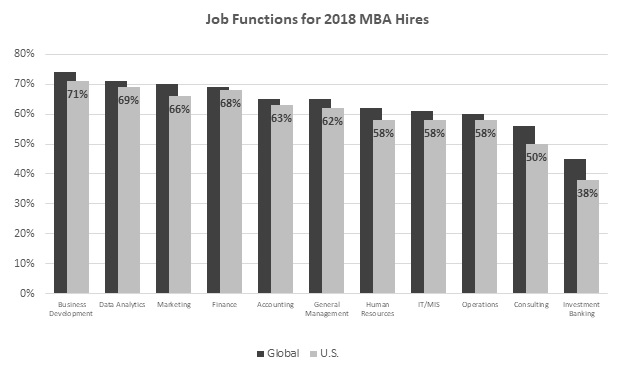The Graduate Management Admission Council (GMAC) recently released its 2018 Corporate Recruiters Survey results, providing insight into current employer hiring demand for MBA graduates.
In 2018, nearly three-fourths of corporate recruiters globally project to hire MBA graduates to fill business development roles. Functions also in high demand world-wide are data analytics (71 percent), marketing (70 percent), and finance (69 percent). The chart below shows the job function recruitment projections for recent MBA hires, globally and in the U.S.
As one would expect, the job functions MBA hires are placed into vary by both region and industry. Below, are a few key industries with the job functions companies plan to fill with MBA hires in 2018.
- Consulting: consulting, business development, data analytics
- Finance: finance, investment banking, accounting
- Health Care: marketing, business development, finance
- Technology: marketing, business development, data analytics
- Products: marketing, business development, finance
Globally, recruiters are more likely to hire MBAs into specialist, rather than generalist roles (52 percent and 48 percent, respectively) and into strategic over operational positions (also 52 percent and 48 percent, respectively). In the U.S., recruiters are equally likely to hire MBA students to fill specialist and generalist jobs and just slightly more likely to place an MBA into a strategic role over an operational one (51 percent and 49 percent, respectively).
Delving more deeply into the specific skill-sets recruiters are looking for when hiring MBAs, a Financial Times survey published in late 2017 asked 48 leading employers what skills they want in MBA graduates, and what skills they have a hard time finding.
The most important skills named by these employers included both soft-skills and strategy. Three of the most important skills, however, were also listed among the least difficult to recruit for: networking, solving complex problems, and working with a wide variety of people. The least important skills were function-specific. And the most difficult to recruit for skills were not listed among the most important, but included a cross-section of disciplines.
Key Take-Aways
Both the GMAC and Financial Times surveys provide telling information on how recruiters classify and evaluate MBA candidates. Begin to think like a recruiter. It will be immensely helpful to you as you embark on your management studies.
1. When considering your career prospects, you should first define your desired role in terms of:
a. Specialist or Generalist;
b. Strategic or Operational; and
c. Job function
Having clear insight into your desired role will help you to find companies and jobs that offer the best fit for your goals. Additionally, knowing precisely what you want in your post-MBA role will help you to develop your elevator pitch and articulate your career vision clearly as you network and interview.
2. Staying abreast of recruiting trends by function, as well as highly coveted and/or difficult to recruit for skills can provide insight on areas where additional experience can help you to differentiate yourself. For example, data analytics is not only a function where hiring is very active for MBA recruiters, but also a skill that has been named as difficult to recruit for. Gaining some experience in this area may help to set you apart in interviews, even if this is not the primary function for which you want to be hired.
3. Consider how you are highlighting not only the most important skills, but also those that are named as difficult to recruit for in your resume, elevator pitch, and interview responses. While your resume should list your specialized skills, this data suggests that highlighting soft and strategic thinking skills may better serve you in those precious networking and interview minutes with potential employers.
4. Finally, think through your differentiating factors and experiences. Recognize that some skills are easier to recruit for than others, and make sure that you’re aware of and highlighting experiences, coursework, and skills that make you unique among the general MBA population.


